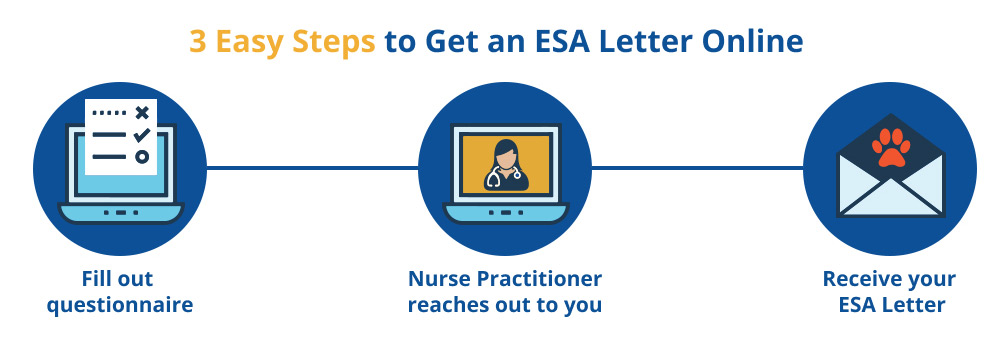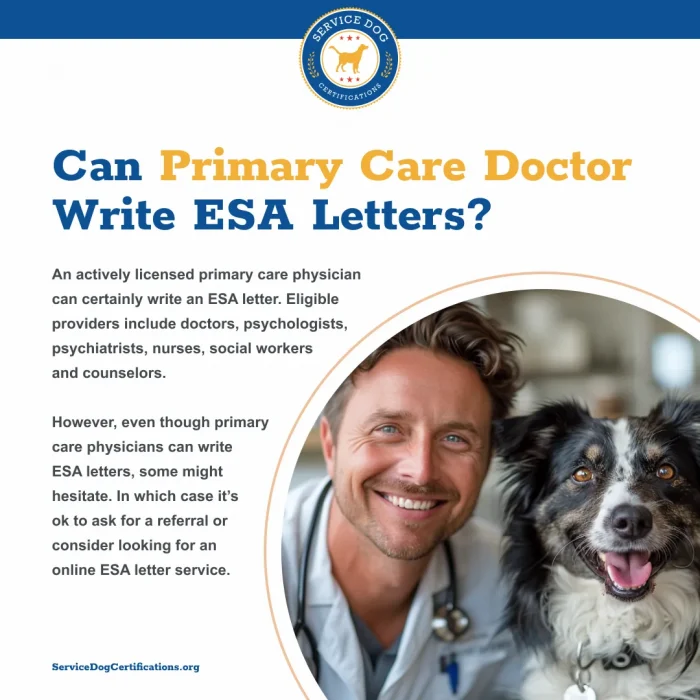Can a Primary Care Doctor Write an ESA Letter?

Your family doctor, also called a primary care physician (PCP), can write a letter recommending an emotional support animal. We’ll explain what legally gives them that ability and explore what better options might be available for you.
Why are Physicians Able to Write an ESA Letter?
To turn your pet into an emotional support animal, federal law requires a recommendation letter (known as an ESA letter) from a healthcare professional who is licensed to practice in your state.
Eligible providers include doctors, psychologists, psychiatrists, nurses, social workers and counselors. An actively licensed primary care physician can certainly write an ESA letter.
PCPs are healthcare professionals who serve as the first point of contact for patients seeking medical attention. Although they play an important role in managing overall health, they may not be the best option for an ESA letter which requires a mental health evaluation.
Why Some Physicians Can’t Write ESA Letters
Even though primary care physicians can write ESA letters, some might hesitate. Their reluctance could stem from unfamiliarity with ESAs, uncertainty about the process of writing the letter, or workplace policies that limit their ability to do so.
In addition, although PCPs are responsible for your general health, they may not be familiar enough with your mental health to feel comfortable writing an ESA letter. That’s why many people find it easier to find a mental health professional specializing in ESA recommendations.
How to Get an ESA Letter if Your PCP Says No
If your PCP says no to your ESA letter request, don’t stress. It doesn’t mean you don’t deserve an emotional support animal. Physicians often can’t write ESA letters for all the reasons we talked about.
Finding a provider who recognizes how an emotional support animal can improve your well-being is crucial. If your PCP can’t write an ESA letter, try asking for a referral. Click here if you need an easy online option.
About the Author: The writing team at Service Dog Certifications is made up of folks who really know their stuff when it comes to disability laws and assistance animals. Many of our writers and editors have service dogs themselves and share insights from their own experiences. All of us have a passion for disability rights and animals.
2 comments
Leave a Reply Cancel reply
Latest Posts

Can you bring a service dog to a museum?
Yes, you can bring your service dog to the museum! All the major U.S. museums welcome guests with service animals in accordance with the Americans with Disabilities Act (ADA). There are some areas, however, that might be off-limits. Here’s what you should know if you plan to spend a day at the museum with your […]

Read More

How to Bring a Service Dog to Six Flags Magic Mountain
Service dogs are welcome at Six Flags Magic Mountain so long as they are, according to Six Flags, “trained to do work or perform tasks for people with disabilities.” Of course, your dog must be housebroken and remain on a leash or harness and under your control while at the park — and the park […]

Read More

When Stores Can Refuse Your Service Dog
According to the Americans with Disabilities Act (ADA), service dogs should be allowed into any store most of the time. A store owner can legally exclude a service dog if they are actively growling, snapping at, or frightening customers, or if the dog is obviously out of the control of its owner. Ordinary behaviors — […]

Read More


how much does this cost?
You can find pricing information on our ESA letter service here: https://www.servicedogcertifications.org/esa-letter/